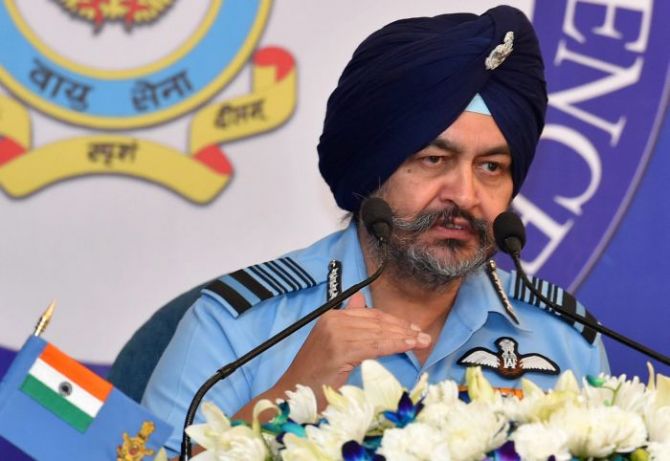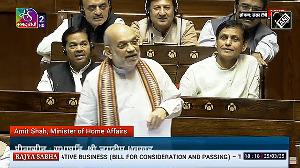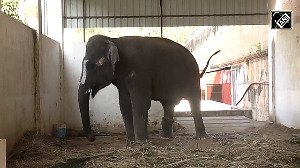
The Indian Air Force is capable of effectively countering any threat from China while engaging in a two-front war also involving Pakistan, Air Chief Marshal B S Dhanoa said on Thursday and indicated that tension still prevailed between Chinese and Indian troops in Doklam.
The IAF chief said Chinese troops were currently present in the Chumbi valley, which is in the Doklam Plateau, and added that a peaceful resolution of the issue would be in the interest of both countries.
"The two sides are not in a physical face-off as we speak. However, their forces in Chumbi Valley are still deployed and I expect them to withdraw as their exercise in the area gets over," Dhanoa told reporters ahead of IAF Day, which is marked on October 8.
Asked about concerns over Pakistan's tactical nuclear weapons and whether the IAF would be able to disarm Islamabad of its nuclear arsenals if necessary, Dhanoa said his force had the capability of locating, fixing and striking across the border.
Asserting that the IAF was capable of a two-front war to counter China and Pakistan, he, however, said the possibility of such a scenario was 'low'.
At the same time he added that India's response had to be based on the enemy's capability as intentions could change overnight.
"We need a strength of 42 squadrons to carry out full spectrum operations in a two-front (war) scenario. It does not mean that we are not capable of fighting a two-front (war) as we speak. We have a Plan B," Dhanoa said.
Army chief Gen Bipin Rawat had said last month that the country should be prepared for a two-front war, insisting that China had started 'flexing its muscles', while there seemed to be no scope for a reconciliation with Pakistan whose military and polity saw an adversary in India.
Currently, the IAF has 33 fighter squadrons and Dhanoa said the force would get the authorised strength of 42 fighter squadrons by 2032.
Asked whether the IAF was ready for a surgical strike across the border, he said it was ready to deal with any challenge and a call on such an operation would have to be taken by the government.
"Surgical strike is a decision that has to be taken by the government. The IAF has the capability to carry out the full spectrum of air operations," he said.
He said a war-like situation may arise if the IAF crossed the border.
On whether the IAF provided any support to the Army for the surgical strike last year and during the Doklam face-off, the IAF chief said, "Whatever was asked from the air force was provided."
WATCH THE VIDEO BELOW
He refused to share further details.
The IAF chief, however, said no air force assets were involved during the Myanmar operation and the surgical strike across the LoC in Jammu and Kashmir last year.
"The IAF is prepared to fight at a short notice in full synergy with the other two sister services should the need arise," he said, adding that the force was in a high state of readiness to fight a war.
About a possible confrontation with China, he said India's air power was 'adequate'.
At the same time, he talked about what China could or could not do from Tibet.
"Our capability is adequate," he said.
The IAF chief also spoke on a range of issues including steps being taken to enhance the strike capability of the force including the acquisition of S-400 'Triumf' long-range air defence missile systems from Russia and 36 Rafale combat jets.
He said the contract for five S-400 missile systems would be signed soon and their delivery would start two years after the deal was struck.
The IAF chief also talked about the mid-life upgrading of Mirage 2000, Mig 29s and Jaguar fleets, adding that the IAF was working to fully achieving a network-centric operational capability.
Dhanoa said a proposal for 83 indigenously built Light Combat Aircraft Mark I was being finalised.
"These men and women under my command are confident of taking on any threat and are fully prepared to undertake the full spectrum of air operations and respond to any challenge in the most befitting manner," said Dhanoa.
When asked about the Army chief's two-and-half front war comment also referring to internal security threats, Dhanoa said, "As a democracy we don't use kinetic air power against our own people."
Air Chief Marshal Dhanoa also said the IAF has the capability of locating and striking nuclear and other targets in Pakistan.
He was asked about global concerns over the safety of Pakistan's tactical nuclear weapons and whether the IAF would be able to disarm Islamabad of its nuclear assets if necessary.
"We have a draft nuclear doctrine. It is answered in that -- what happens when the enemy decides to use nuclear weapons on us. As far as IAF is concerned, it has the ability to locate, fix and strike and that is not only for tactical nuclear weapons but for other targets across the border (as well)," he said.
Air Chief Marshal Dhanoa said the IAF has the capabililty to carry out 'full spectrum' of offensive at a 'short notice' to thwart any security challenge facing the country.
"The IAF is prepared to fight at short notice in full synergy with other two sister services should the need arises. The IAF has the capabiliuty of sustaining operational preapardness for a prolonged period," he said, referring to overall threat perception facing the country.
Last month, Pakistan Prime Minister Shahid Khaqan Abbasi had said his country has developed short-range nuclear weapons to counter the 'Cold Start' doctrine of the Indian Army.
Cold Start doctrine' was developed by the Indian Army for a possible war with Pakistan. This doctrine involves various branches of the Army conducting offensive operations as part of unified battle groups.
There has been global concerns over safety of nuclear weapons in Pakistan. In August, a senior Trump administration official said the United States was worried that nuclear weapons and materials in Pakistan might land up in the hands of terrorist groups or individuals.
The Nuclear Command Authority of Pakistan is responsible for command, control and operational decisions regarding the country's nuclear arsenals.
IMAGE: Air Chief Marshal B S Dhanoa addresses a news conference ahead of Air Force Day, in New Delhi on Thursday. Photograph: Kamal Kishore/PTI Photo











 © 2025
© 2025